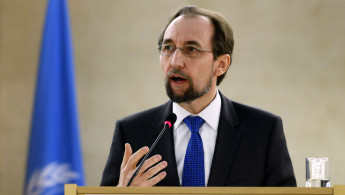UN human rights chief 'alarmed' by Gulf-led blockade against Qatar
The UN has spoken of alarm about the Gulf-led blockade on Qatar, warning it could lead to widespread suffering among ordinary people.
Zeid Raad al-Hussein, the UN's High Commissioner for Human Rights, said that moves by Saudi Arabia, UAE, Bahrain and Egypt to punish Qatar were a serious concern and he was alarmed by its possible consequences.
"I am alarmed about the possible impact on many people's human rights in the wake of the decision by Saudi Arabia, the United Arab Emirates (UAE), Egypt and Bahrain to cut diplomatic and economic ties with Qatar," Zeid said in a statement.
"It is becoming clear that the measures being adopted are overly broad in scope and implementation."
It comes after the UAE and Bahrain threatened jail for anyone expressing sympathy with Qatar following the Gulf-led blockade on the country.
"I am also extremely troubled to hear that the UAE and Bahrain are threatening to jail and fine people who express sympathy for Qatar or opposition to their own governments' actions, as this would appear to be a clear violation of the right to freedom of expression or opinion."
The UAE, Saudi Arabia and Bahrain gave Qataris residing in their countries 14 days to leave.
"Among those likely to be badly affected are couples in mixed marriages, and their children; people with jobs or businesses based in states other than that of their nationality; and students studying in another country," he said.
The three Gulf countries and Egypt also branded a group of Qatar-based individuals as "terrorists" in a list made public and which included several well-known figures and charities.
Qatar and the UN both rejected the so-called "terror list".
Zeid has called on the parties involved to end the blockade through dialogue and "refrain from any actions that could affect the well-being, health, employment and integrity of their inhabitants".
Human rights groups such as Amnesty International have also condemned the blockade, civil liberties violations and diplomatic boycott by Gulf states.
Agencies contributed to this story.





 Follow the Middle East's top stories in English at The New Arab on Google News
Follow the Middle East's top stories in English at The New Arab on Google News

![Israeli forces ordered bombed Gaza's Jabalia, ordering residents to leave [Getty]](/sites/default/files/styles/image_330x185/public/2176418030.jpeg?h=a5f2f23a&itok=_YGZaP1z)
